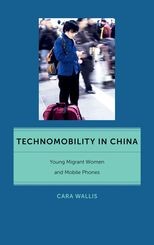 Technomobility in China: Young Migrant Women and Mobile Phones
Technomobility in China: Young Migrant Women and Mobile Phones
Contents
-
-
-
-
-
Hukou and the Urban-Rural Divide Hukou and the Urban-Rural Divide
-
Hukou Policy under Mao Hukou Policy under Mao
-
Economic Reforms and Inequality Economic Reforms and Inequality
-
-
The Floating Population and Hukou Erosion The Floating Population and Hukou Erosion
-
China’s Dagongmei China’s Dagongmei
-
Migration Patterns and Employment Migration Patterns and Employment
-
Motivations Motivations
-
-
Female Migrants and Suzhi Female Migrants and Suzhi
-
China’s Consumer Revolution: From a “Society of Relative Comfort” to a “Harmonious Society” China’s Consumer Revolution: From a “Society of Relative Comfort” to a “Harmonious Society”
-
The Construction/Consumption of Femininity in the Post-Mao Era The Construction/Consumption of Femininity in the Post-Mao Era
-
Telecommunications Development in the Reform Era Telecommunications Development in the Reform Era
-
Early Growth Early Growth
-
“Market Socialism” and the “Telecommunications Revolution” “Market Socialism” and the “Telecommunications Revolution”
-
The Mobile Revolution The Mobile Revolution
-
Mobile Use Mobile Use
-
Pricing, Plans, and Prestige Pricing, Plans, and Prestige
-
Short Messaging Service, Instant Messaging, and Social Networking Short Messaging Service, Instant Messaging, and Social Networking
-
-
-
Conclusion Conclusion
-
-
-
-
-
-
-
-
1 Market Reforms, Global Linkages, and (Dis) continuity in Post-Socialist China
Get access-
Published:January 2013
Cite
Abstract
This chapter outlines the specific socio-cultural context of contemporary China at the beginning of the 21st century. To set the stage for the rest of the text, the chapter discusses the reforms of the post-Mao period, the history of the urban–rural divide perpetuated by the hukou (household registration system), and the phenomenon of rural-to-urban migration. Though in the mid-1980s rural peasants had engaged in non-farm work, particularly in township and village enterprises (TVEs) as the urban-and eastern-centered economic reforms progressed and as the old apparatuses of state control were broken down, more and more rural residents were compelled to “leave the land.” The chapter emphasizes how shifting ideologies related to gender, class, and place play a pivotal role in shaping rural women's experience, during both the Mao-era planned economy and China's reform-era embrace of markets and global capitalism.
Sign in
Personal account
- Sign in with email/username & password
- Get email alerts
- Save searches
- Purchase content
- Activate your purchase/trial code
- Add your ORCID iD
Purchase
Our books are available by subscription or purchase to libraries and institutions.
Purchasing information| Month: | Total Views: |
|---|---|
| November 2022 | 2 |
| November 2023 | 1 |
| April 2024 | 1 |
| August 2024 | 2 |
| April 2025 | 3 |


Get help with access
Institutional access
Access to content on Oxford Academic is often provided through institutional subscriptions and purchases. If you are a member of an institution with an active account, you may be able to access content in one of the following ways:
IP based access
Typically, access is provided across an institutional network to a range of IP addresses. This authentication occurs automatically, and it is not possible to sign out of an IP authenticated account.
Sign in through your institution
Choose this option to get remote access when outside your institution. Shibboleth/Open Athens technology is used to provide single sign-on between your institution’s website and Oxford Academic.
If your institution is not listed or you cannot sign in to your institution’s website, please contact your librarian or administrator.
Sign in with a library card
Enter your library card number to sign in. If you cannot sign in, please contact your librarian.
Society Members
Society member access to a journal is achieved in one of the following ways:
Sign in through society site
Many societies offer single sign-on between the society website and Oxford Academic. If you see ‘Sign in through society site’ in the sign in pane within a journal:
If you do not have a society account or have forgotten your username or password, please contact your society.
Sign in using a personal account
Some societies use Oxford Academic personal accounts to provide access to their members. See below.
Personal account
A personal account can be used to get email alerts, save searches, purchase content, and activate subscriptions.
Some societies use Oxford Academic personal accounts to provide access to their members.
Viewing your signed in accounts
Click the account icon in the top right to:
Signed in but can't access content
Oxford Academic is home to a wide variety of products. The institutional subscription may not cover the content that you are trying to access. If you believe you should have access to that content, please contact your librarian.
Institutional account management
For librarians and administrators, your personal account also provides access to institutional account management. Here you will find options to view and activate subscriptions, manage institutional settings and access options, access usage statistics, and more.